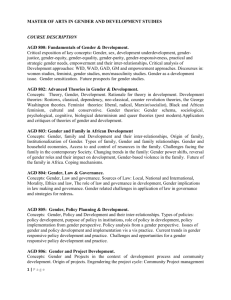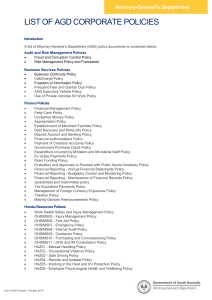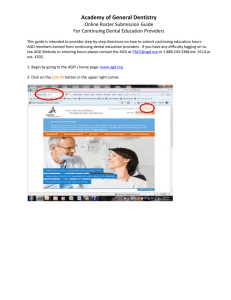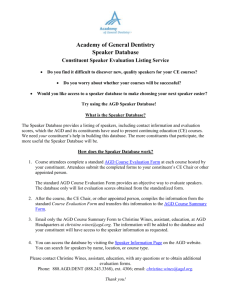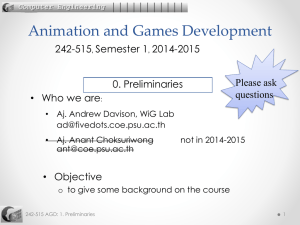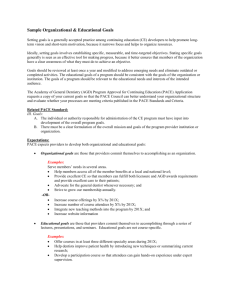DEPARTMENT OF GENDER AND DEVELOPMENT STUDIES
advertisement
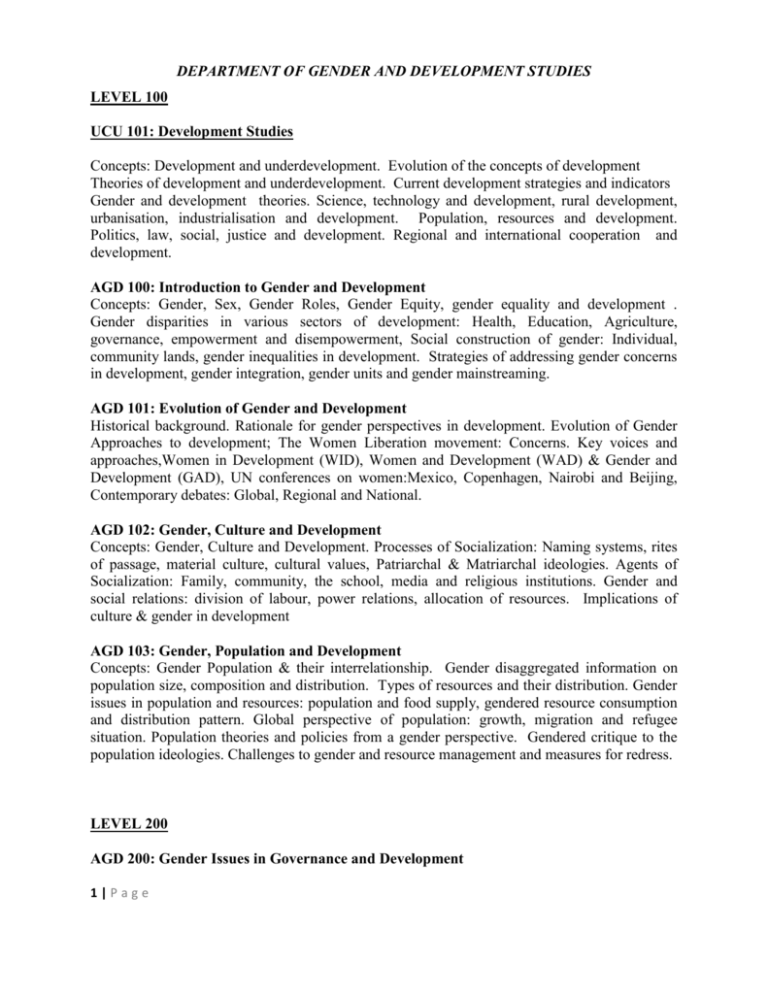
DEPARTMENT OF GENDER AND DEVELOPMENT STUDIES LEVEL 100 UCU 101: Development Studies Concepts: Development and underdevelopment. Evolution of the concepts of development Theories of development and underdevelopment. Current development strategies and indicators Gender and development theories. Science, technology and development, rural development, urbanisation, industrialisation and development. Population, resources and development. Politics, law, social, justice and development. Regional and international cooperation and development. AGD 100: Introduction to Gender and Development Concepts: Gender, Sex, Gender Roles, Gender Equity, gender equality and development . Gender disparities in various sectors of development: Health, Education, Agriculture, governance, empowerment and disempowerment, Social construction of gender: Individual, community lands, gender inequalities in development. Strategies of addressing gender concerns in development, gender integration, gender units and gender mainstreaming. AGD 101: Evolution of Gender and Development Historical background. Rationale for gender perspectives in development. Evolution of Gender Approaches to development; The Women Liberation movement: Concerns. Key voices and approaches,Women in Development (WID), Women and Development (WAD) & Gender and Development (GAD), UN conferences on women:Mexico, Copenhagen, Nairobi and Beijing, Contemporary debates: Global, Regional and National. AGD 102: Gender, Culture and Development Concepts: Gender, Culture and Development. Processes of Socialization: Naming systems, rites of passage, material culture, cultural values, Patriarchal & Matriarchal ideologies. Agents of Socialization: Family, community, the school, media and religious institutions. Gender and social relations: division of labour, power relations, allocation of resources. Implications of culture & gender in development AGD 103: Gender, Population and Development Concepts: Gender Population & their interrelationship. Gender disaggregated information on population size, composition and distribution. Types of resources and their distribution. Gender issues in population and resources: population and food supply, gendered resource consumption and distribution pattern. Global perspective of population: growth, migration and refugee situation. Population theories and policies from a gender perspective. Gendered critique to the population ideologies. Challenges to gender and resource management and measures for redress. LEVEL 200 AGD 200: Gender Issues in Governance and Development 1|Page Theories of governance and gender implications. Types of governance from a gender perspective: Indigenous, modern, participatory governance at local, national and international levels. Issues of governance: Corruption, leadership, ethnicity, land civil and human rights, and gender implications. Institutions of governance: Political parties, devolution and national machinery. Role the media and civil society in governance. Constitution and democracy: Gender representation and participation. AGD 201: Introduction to Gender and Development Theories Concepts: Gender, theory and development and their interrelationships. Rationale. Overview of Theories of Development: Classical, Modernism, Dependency, and World Systems Theory. Modern development paradigms: Feminism, masculinities, application of theories. Critique of theories. AGD 202: Participatory Approaches in Gender and Development (new title) Concepts: Participation and Gender and their interrelationships. Historical origins and evolution of participatory techniques from a gender perspective. Rapid Rural Appraisal (RRA). Participatory Rural Appraisal (PRA). Pillars of participatory development. Gender dynamics in participatory development. Application and uses of participatory methods and tools: such as mapping, surveys, observation. Constraints to participatory development and measures for redresses. AGD 203: Gender in Agriculture and Development (New title) Concepts: Gender, Agriculture and Development. Traditional and Modern methods of agriculture and development. Gender, Land tenure and Utilization systems. Gender Relations in agricultural division of labour. Agriculture and Mechanization and gender implications. Agriculture and technology from a gender perspective. Policy issues in agricultural development and gender implications. Challenges facing agricultural sector from a gender perspective and measures for redress. LEVEL 300 CORES AGD 300: Gender Analysis Frameworks Concepts: Gender, empowerment, Analysis & frameworks. Rationale for gender analysis. Gender analysis frameworks –ABC of Gender Analysis, Harvard, Caroline Moser, Sarah Longwe, People Oriented Planning (POP), Social Relations Framework (SRF), Gender Analysis Matrix, Community Analysis matrix. Capacities and vulnerabilities analysis, Criteria for selecting of frameworks. Application and critique of Gender analysis Frameworks. AGD 301: Gender Based Violence (New Title) Concepts: Violence, Gender Based Violence (GBV), Sexual Gender Based Violence (SGBV), VAW and development. Theories of Gender Based violence. GBV as a human rights issue, Types, Causes and effects of gender based violence on development. Femininities and masculinities in GBV. The vicious cycle of Gender based violence. Legislation and policy 2|Page against GBV. Challenges to addressing gender based violence. Role of men and women in combating GBV at both micro and macro levels. AGD 302: Research Methods (To be offered at the School Level) AGD 303: Gender and Environmental Management Concepts: Gender, Environmental management and conservation. Current debates: Allocation, access and control, climatic change and pollution. Conservation. Framework for Gender analysis of resources and benefits: Effects of environmental changes on gender relations. Gender and sustainable development: eco-systems, agro-forestry practices, environmental degradation, the green revolution, gendered impact of environmental policies and programmes. National Environmental management mechanisms. Challenges and prospects mainstreaming gender in environmental management. AGD 304: Gender in Regional Cooperation and Development (new title) Concepts: Gender, Regional Cooperation, Development. Rationale: Forms of regional cooperation. Gender disparities in economic and political integration. Gender gains in regional cooperation, integration & development. Impact of regional blocks on development. EU, North American Free Trade Area (NAFTA), African Union (AU), Africa Growth and Opportunity Act (AGOA), Economic Commission of West African State. (ECOWAS), Common Market for Eastern and Southern Africa (COMESA), Southern Africa Development Area Community (SADC), East African Community. Regional gender mainstreaming instruments: SADC protocal, Maputo protocal: Gender challenges facing regional cooperation and integration, implications and measures for redress. AGD 305: Gender, Project Planning, Development & Management. Concepts: Gender in project planning, project development and Project Management. Theories of Project Management. Historical perspective of project development. Gender responsive project cycle. Gender responsive indicators. Project proposal writing: general proposals and proposals for funding. Elements of Gender responsive project development and management. Project tracking and appraisal techniques; monitoring and evaluating project packages for gender responsiveness. Gender budgeting in project management. Challenges and prospects of project sustainability from a gender perspective. AGD 307: Gender Dimensions in Community Mobilization and Development Concepts: Community, Mobilization and Development. Rationale. Approaches in community mobilization and development from a gender perspective. Origins of community development. Philosophy, principles of community development and gender dynamics. Role of indigenous knowledge in community mobilization & development. Group dynamics: leadership, communication, change agencies and agents, culture, attitude and social change and gender implications. Challenges to community mobilization & development Measure for redress. AGD 313: Gender, Language and Communication (New Unit) Concepts gender inclusive/ sensitive language in communication. Gender theories and communication. Predominant social assumptions and communication norms and impact on gender relations. Creation, maintenance and change of gender perceptions through 3|Page communication. Skills in identifying gendered expectations and their impact on the behavior of men and women. Challenges and prospects in gender inclusive language use and communication. OPTIONS AGD 310: Gender Issues in Science, Technology & Development. Concepts: Science, Technology and Development. Gendered contribution of indigenous science and technology and its implications for development. Indigenous technological variations. Transition and adoption of science and technology. Science and technology policies and gender implications. Engendering science and technology for national development. Challenges posed by science & technology and strategies for mitigation AGD 312: Gender Dimensions in Rural and Urban development (Merge 312 & 314) Concepts: Gender, Urban and Rural Development. Rationale for urban and rural development. Trends in formation and development of urban and rural settlements. Factors fueling rural-urban migration and gender implications. Gender and the process of change in rural development. Role of urbanization in development and gender implications. Gender issues in urbanization and industrialization and rural development. Gender dimensions in spontaneous and informal settlements. Rural and Urban planning and its gender implications. Challenges to sustainable urban and rural development and strategies for redress. AGD 315: Violence Against Women (New Title) Concepts: Violence against women (VAW). Rationale: Distinction between VAW & GBV. Global, regional, national prevalence of VAW. Theories. Types and forms of VAW: Sexual, physical, psychological, cultural, infanticide, trafficking of women, forced abortions, female genital mutilation, homicide, child sexual abuse. Impact of VAW the individual, family, community and on development. Strategies of addressing VAW, Policies and legislation: International, national, communal and religious. Challenges to implementation. AGD 316: Gender, Children and Development Issues in Africa UN Conventions of the rights of the child, African charter on the rights and welfare of the child, the constitution of Kenya 2010. Children’s Act 2001, gender issues in education, health, gendered exploitation of child labour, child prostitution, impact of HIV/AIDs epidemic on boys and girls, the child in armed conflict, and its impact on boys and girls, the vulnerability of the girl and the boy-child, the role of UNICEF and other international development agencies and NGOs and identification of best practices for development work with children. LEVEL 400 CORES 4|Page AGD 402: Gender Planning, Policy Formulation and Implementation Concepts: Gender planning, National Planning, Policy Formulation, implementation. Rationale: Policy formulation processes from a gender perspective. National gender policy and gender machinery. Gender planning and policy approaches to womens development(Caroline Moger). Types of policies and frameworks: EFA, water for all. Millenium development goals, poverty reduction, wealth creation. Typology of policies by gender: gender blind, gender neutral, gender redistributive and gender responsive. Sectrol and organizational gender policies. Micro and macro planning tools, strategies and their gender implications. Challenges and prospects in gender planning, policy formulation and implementation. AGD 403: Gender, Population and Resource Management Concepts: Gender population and resource management. Gender disaggregated information on population size, composition and distribution. Global perspective of population growth and its gender implications. Population theories from a gender perspective. Gendered critique to the population ideologies. Gender issues in population and resources: population and food supply, gendered resource consumption and distribution patterns. Gender issues of human Ecology. AGD 405: Gender, Human Rights and Development. Concepts: Gender, human rights development, Evolution of Human rights and human rights approach to programming. Classification of human rights Gender and human rights in Africa and its implications. International, Regional and national human rights instruments: Universal declaration of human rights 1948, Maputo protocal, the constitution of Kenya 2010. International and regional oversight bodies and gender implications Culture and human rights of vulnerable groups: handicapped, refugees, women, children. Challenges to realization of Human Rights and strategies for redress. AGD 407: Gender Issues in Conflict Management and Peace Building Concepts: conflict, management & peace building from a gender perspective. Theories of conflict management & peace building. Gendered patterns and characteristics of conflict. Gendered Impact of conflicts. Gender responsive conflict management. Models of conflict management and peace building. Local, National and International instruments and strategies in conflict management and peace building from a gender perspective. Indigenous & Contemporary approaches to conflict management and peace building. Gender challenges in conflict management and peace building and Measures for redress. AGD 408: Gender Mainstreaming Concepts: Gender mainstreaming. Rationale for gender mainstreaming: International, regional and national. Mainstreaming gender concerns in public, private and informal sectors. Tools for gender mainstreaming: Policies, national budget, planning and human resource development. Challenges to gender mainstreaming. AGD 410: Gender and Empowerment (New title) Concepts: Gender, empowerment and its rationale. Theories of empowerment. Types of empowerment: Physical, social, economic, cultural tools for empowerment from a gender perspective. Opportunities, diversities and empowerment. Challenges to empowerment women 5|Page and men at micro & macro levels. Gender inclusive empowerment strategies. Measures to address the challenges. AGD 411: Gender, Reproductive Health and Human Sexuality (New title) Concepts: Gender, Health, Reproductive Health, Human Sexuality, development. Health analyzed from a holistic approach: social, cultural, economic, political and physical. Gender issues in reproductive health: HIV/AIDS, maternal mortality, contraceptives, abortion, adolescent sexuality and implications fro masculinities and femininities Reproductive health policies. The role of women and men as health care providers. Constraints and opportunities in health provisions and utilization. Gendered patterns of infection and management of diseases prevention and gender implications. AGD 415: Gender, Education and Development Concepts: gender, education and development and their interrelationships. The rationale for gender issues in education: access, retention, performance, participation and transition and development. Gender policy in education. Curriculum: development and practice from a gender perspective. Gender analysis tools in education. Gender responsive indicators in the educational system. Challenges to gender mainstreaming in the Education sector & measures of redress. OPTIONS AGD 400: Statistics. (To be offered at the School Level). AGD 401: Project Students will research on a gender and development topic of their choice under the guidance of the department. The project will be initiated in the first semester of level 400 and will be expected to take up most of the second semester of the same year. The purpose will be to give students opportunity to apply some of the gender and development theoretical frameworks including gender analysis to a concrete life situation. The project will include field research and the results will be presented as written report-dissertation of about 5000-8000 words. It should be completed at end of the 4th year. AGD 416: Gender and the Media (New title) Concepts: gender and media. Types of media: print media, electronic media, social media, popular culture, language and communication systems. Media policies: Tools for gender analysis of the media. Role of media in the development process: advocacy, dissemination, mobilization and provision of information. Gender portrayal in the media. Gender stereotypes in the media. Challenges to gender responsiveness in the media, strategies for redress and implications for development. AGD 417: Gender, Religion and Development (New title) Concepts: Gender and religion. Role of religion in defining the status of women and men in society. Impact of religious traditions, beliefs and practices on gender relations: African/Western /oriental religious beliefs and practices. Role of religion in development. Religion and GBV: Gender ideologies perpetuated through religion and religious practices and their implications on 6|Page gender relations in institutions: marriage, the family, myths, traditional rites of passage among others. Strategies for making religion gender responsive. 7|Page
